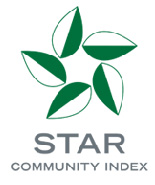| |
 New STAR Community Index, with AIA on Board, Stands Poised to Help American Communities Get Green New STAR Community Index, with AIA on Board, Stands Poised to Help American Communities Get Green
Volunteers wanted to serve on eight technical committees to share architects’ insight and know-how
by Brooks Rainwater
Director, Local Government Relations
Summary: The new STAR Community Index offers a framework for evaluating, measuring, and improving the sustainability and livability of U.S. communities. The ICLEI–Local Governments for Sustainability, U.S. Green Building Council, and Center for American Progress established a partnership to develop this index. The AIA has joined these founding organizations and 25 cities and counties, as well as 12 other associations/organizations, to serve on the steering committee that will develop the sustainability benchmarking and evaluation tool.
Upon its planned completion in 2009-2010, the STAR Community Index aims to become the nationally recognized framework for local governments to ensure a level of rigor and integrity to the sustainability data, measurements, and outputs these communities intend to achieve. At the first meeting of the STAR Community Index Steering Committee on September 29-30, in Washington, D.C., the group agreed that the index should be a Web-based tool for communities that want third-party certification, as well as a tool for beginner communities that want to move toward a more sustainable model but do not yet want third-party certification.
The STAR Community Index will offer a model for communities to measure and benchmark sustainability, allowing localities to minimize the investment of valuable resources in creating rating systems themselves. STAR indeed will be a rating/assessment tool, not a ranking tool, for communities. This is not meant, however, to discourage areas leading sustainability efforts—such as Chicago or New York City—from using the Star Community Index to compete with each other, thus building on sustainability successes.
Call for volunteers
The STAR Community Index is currently seeking volunteers to serve on Technical Committees that will focus on:
- Natural Systems (ecosystems, habitat, water, storm water, air quality, and resource conservation)
- Planning & Design (land use, transportation and mobility, and parks, open space and recreation)
- Energy & Climate (energy, emissions, renewable energy, and green building)
- Economic Development (clean technologies, green jobs, local commerce, tourism, and local food)
- Employment and Workforce Training (green job training, workforce wages, and youth skills)
- Education, Arts, and Community (education excellence, arts, civic engagement, and social equity)
- Children, Health, and Safety (community health, access to health care, and public safety)
- Affordability and Human Dignity (affordable, workforce housing, poverty, and human services).
The application and additional information are available on the ICLEI Web site. |
|


 New STAR Community Index, with AIA on Board, Stands Poised to Help American Communities Get Green
New STAR Community Index, with AIA on Board, Stands Poised to Help American Communities Get Green